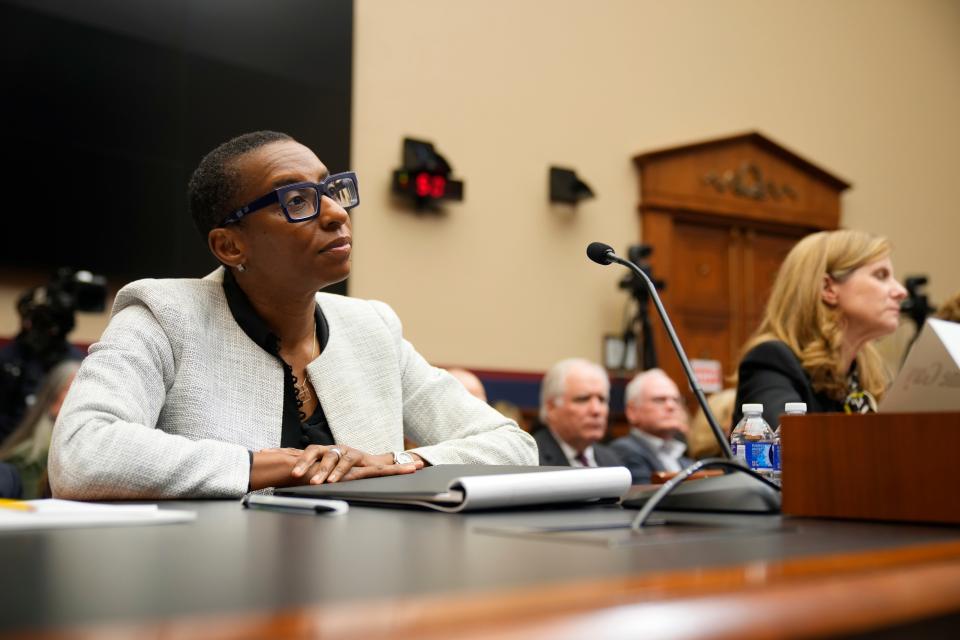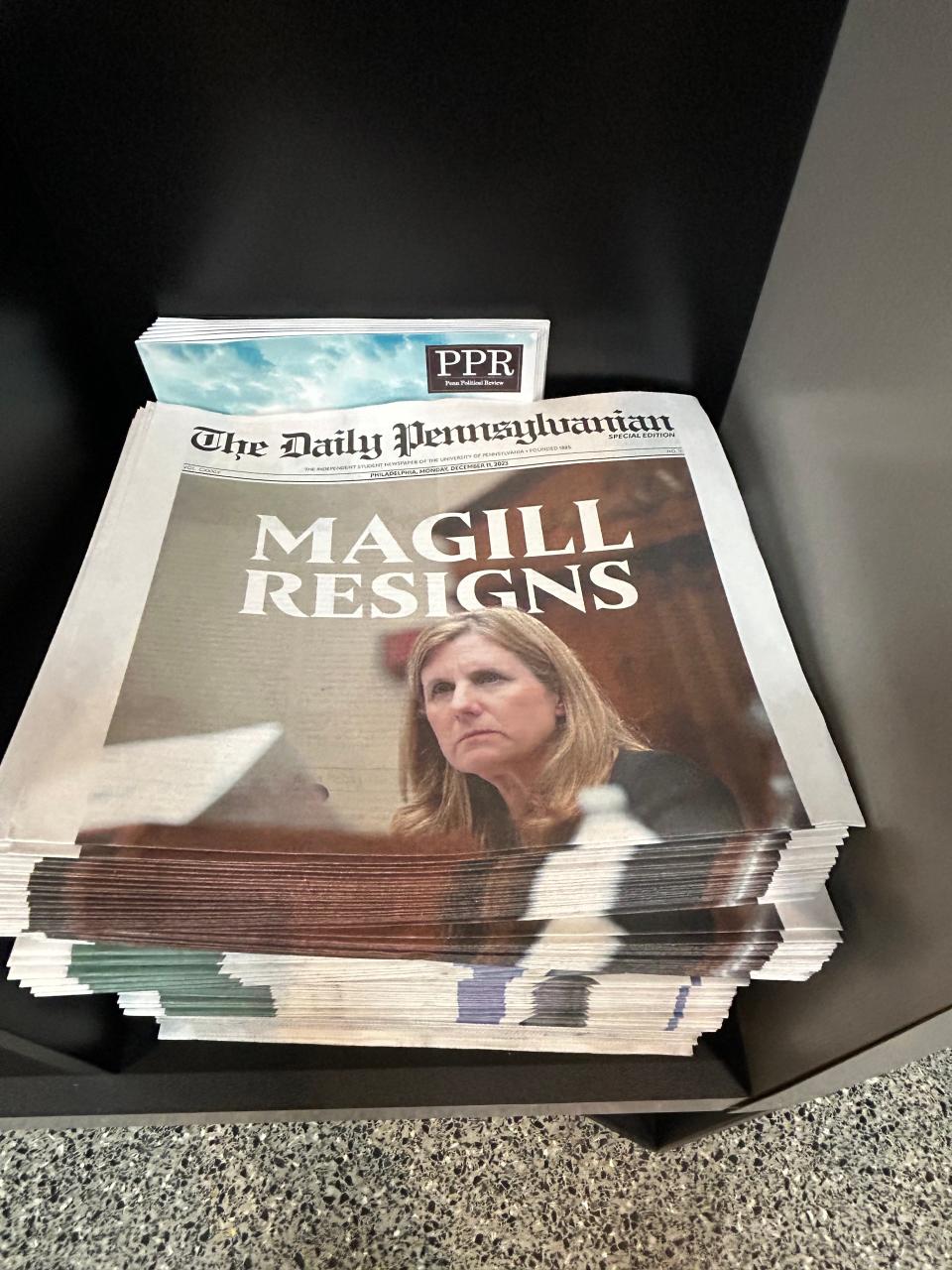Harvard President Claudine Gay to remain, university leaders affirm support
- Oops!Something went wrong.Please try again later.
- Oops!Something went wrong.Please try again later.
CAMBRIDGE, Mass. − Harvard President Claudine Gay will retain her job after a meeting Monday of university leaders that followed intense criticism about her response to antisemitism on her campus, including a grilling by congressional lawmakers last week, since the start of the Israel-Hamas war.
"We today reaffirm our support for President Gay’s continued leadership of Harvard University," the Harvard board said in a statement posted early Tuesday. "Our extensive deliberations affirm our confidence that President Gay is the right leader to help our community heal and to address the very serious societal issues we are facing."
Gay's responses to whether discussion of the genocide of Jews would violate Harvard policies led a group of bipartisan lawmakers to call for her ouster, as did prominent and wealthy alumni.
Instead of responding with the simple "yes" that New York Republican Rep. Elise Stefanik was seeking, Gay, when pressed, replied that "antisemitic rhetoric when it crosses into conduct, that amounts to bullying, harassment, intimidation, that is actionable conduct, and we do take action."
She elaborated on her comments on social media and in an interview with The Harvard Crimson, the Ivy League institution's student newspaper.
“There are some who have confused a right to free expression with the idea that Harvard will condone calls for violence against Jewish students,” she said in a statement posted on the social media platform X the day after the hearing. “Let me be clear: Calls for violence or genocide against the Jewish community, or any religious or ethnic group are vile, they have no place at Harvard, and those who threaten our Jewish students will be held to account.”
Nevertheless, Stefanik announced investigations of Harvard, MIT and Penn late last week.
Colleges consider legacy in admissions: New data finds hundreds of institutions look at family ties.
'Redoubling the university's fight against antisemitism'
In its statement, the Harvard Corporation acknowledged Gay's missteps during the testimony and noted her apology.
"So many people have suffered tremendous damage and pain because of Hamas’s brutal terrorist attack, and the University’s initial statement should have been an immediate, direct, and unequivocal condemnation. Calls for genocide are despicable and contrary to fundamental human values," the statement continued. "President Gay has apologized for how she handled her congressional testimony and has committed to redoubling the University’s fight against antisemitism."

Her fate differs from that of another president who faced congressional questions: On Saturday, University of Pennsylvania President Liz Magill, who appeared alongside Gay and Massachusetts Institute of Technology President Sally Kornbluth, resigned after a similar critique.
Despite the furor, Gay drew petitions in support of her presidency, including one by 700 faculty and another by Black faculty. Gay is Harvard’s first Black president and began the role earlier this year. And Harvard's most prominent alumni group unanimously backed Gay in a letter sent to the university's governing boards on Monday, according to a copy of the letter provided by the university to USA TODAY.
“The suggestion that she would not stand boldly against manifestations of antisemitism and any suggestion that her selection as president was the result of a process that elevated an unqualified person based on considerations of race and gender are specious and politically motivated,” the petition by Black faculty reads.
Harvard, MIT, Penn under a microscope: Pressure mounts on Ivy League universities to address antisemitism after presidents testify
Students, however, seemed far less attuned to the leadership tussle than lawmakers and the media.
Several passing through campus' Science Center Plaza, just outside the gates of Harvard Yard, said they were not well informed or did not care enough about the issue to comment.
The few who were willing to talk told USA TODAY they support Gay.
Riley Cullinan, a member of the Harvard class of 2027, said she sees Gay as someone who is trying her best in an incredibly difficult situation.
“If the staff is rallying behind her, there’s probably a reason,” said Cullinan, who hasn’t yet decided on a major. “She deserves a chance to settle in.”
Freshman Jacob Winter, of Lovettsville, Virginia, agreed Gay should be given a longer chance at the presidency, praised her for her commitment to free speech and said she should not be held to unrealistic standards of perfection.
“Her remaining feels like a victory for something,” said Winter, who was still forming an opinion about the matter as he headed away from the freshman dining hall with his breakfast shortly after noon. “I think it would have been wrong if she would have been forced out because some student held unpalatable views.
"She was being held hostage by the donors and I think that was wrong.”
Winter said he knew a little about the tension between the Israelis and Palestinians before the war, but has quickly educated himself since it began and now says he sympathizes with both sides. On campus, he said, he doesn’t think Jewish students should face antisemitism but nor should students who speak out in favor of Palestinians be doxxed or have their futures taken away merely for expressing their opinions.
So far on campus, he said, he’s seen only “spirited debate and openness” to considering all sorts of views.
“That’s what college is for,” he said.
Concerns raised about integrity of Gay's work, thesis
The Harvard board also addressed accusations about Gay’s dissertation. Gay earned her doctorate from Harvard and joined the faculty in 2006 as a professor of government before becoming a dean.
The board said it learned in late October of concerns about three articles Gay published and at her request launched an independent review of her published work. The review found “a few instances of inadequate citation.”
“While the analysis found no violation of Harvard’s standards for research misconduct, President Gay is proactively requesting four corrections in two articles to insert citations and quotation marks that were omitted from the original publications,” the board statement said Tuesday.
Stefanik, in a post on X reacting to Gay retaining her post, excoriated the Harvard president.
“There have been absolutely no updates to @Harvard’s code of conduct to condemn the calls for genocide of Jews and protect Jewish students on campus,” Stefanik wrote. “The only update to Harvard’s code of conduct is to allow plagiarists as president.”
Student Chiamaka Ihejirika, a freshman and computer science major, however, blamed a “smear campaign” for the negative publicity about her comments and the concerns about possible plagiarism in her scholarship, which Ihejirika dismissed as issues of attribution. “We’ve had worse” presidents of Harvard, she said.
What is the Harvard Corporation?
The Harvard Corporation is the top governing body of Harvard, and its members have backgrounds in finance, academia, international relations and business.
The group was founded in 1650 and is the “oldest corporation in the Western Hemisphere,” its website says. The corporation, together with the university’s Board of Overseers, functions like a board of trustees.
Most members of the Harvard Corporation − called fellows − have at least one degree from the institution.
Fellows Biddy Martin and Shirley Tilghman have decades of experience leading other selective colleges. Martin is a past president of Amherst College in Western Massachusetts and Tilghman, a molecular biologist, led Princeton University from 2001 to 2013.
Many fellows of the Harvard Corporation have ties to big companies and business: Kenneth Chenault is CEO of American Express; Penny Pritzker was secretary of commerce under President Barack Obama; and Karen Gordon Mills was head of the Small Business Administration, also in the Obama administration.
What's different about Harvard and Penn?
Harvard and Penn, though both members of the Ivy League athletic conference, have significantly different financial resources, and therefore different relationships with – and reliance upon – their alumni. Harvard, for instance, is the wealthiest university in the U.S., with a roughly $50 billion endowment. Penn, on the other hand, has an endowment less than half that size.
And their population of Jewish students is different, too. According to the most recent estimates from the Jewish student group Hillel, the amount of Jewish undergraduates at Harvard is less than half of the number enrolled at Penn.
Professors, free speech advocates condemn Magill's exit
Magill's resignation on Saturday, and the ensuing calls for the other presidents to step aside, alarmed a number of professors and free speech advocates, who decried what they saw as a frightening precedent.

"I can't shake the feeling that this could embolden new political or donor led campaigns to exert undue control over universities," wrote Jonathan Friedman, director of free expression and education programs at the free speech organization PEN America, on X.
The Penn chapter of the American Association of University Professors, a prominent national faculty group, wrote in a statement Saturday responding to Magill's resignation that donors, lobbyists and politicians had successfully waged a campaign to "destabilize" the school.
"These distortions and attacks on our colleagues have not addressed the scourge of antisemitism − a real and grave problem," they wrote. "Instead, they have threatened the ability of faculty and students to research, teach, study, and publicly discuss the history, politics, and cultures of Israel and Palestine."
Penn announced Tuesday that Dr. J. Larry Jameson, executive vice president of the University of Pennsylvania for the Health System and dean of the Raymond and Ruth Perelman School of Medicine, will serve as interim president at Penn effective immediately.
Contributing: Claire Thornton
This article originally appeared on USA TODAY: Harvard President Claudine Gay to remain after controversial remarks

